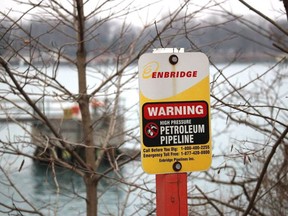With Michigan back in US federal US court this week continuing its long fight to shut down a pipeline vital to industries and jobs in Sarnia and Eastern Canada, Sarnia Mayor Mike Bradley says the dispute has turned into “a lottery ticket” for US lawyers.

With Michigan back in US federal US court this week continuing its long fight to shut down a pipeline vital to industries and jobs in Sarnia and Eastern Canada, Sarnia Mayor Mike Bradley says the dispute has turned into “a lottery ticket” for US lawyers.
Advertisement 2
Article content
Bradley, one of many voices warning of the potential economic impact if opponents of Enbridge Inc.’s Line 5 pipeline shut it down, said, “it’s hard to believe (that it’s) five years this has been going on.”
Article content
Michigan attorneys pressed a federal appellate panel Thursday to move their lawsuit seeking to shut down a portion of the pipeline running under the Straits of Mackinac to state court, arguing state environmental protection laws are in play.
Sarnia is home to three of Ontario’s four oil refineries and community officials have warned shutting down Line 5, part of a pipeline system supplying oil and natural gas liquids to the community’s petrochemical industries, could have an impact on thousands of Canadian jobs.
Advertisement 3
Article content
Bradley said there’s a need “to get this (pipeline issue) to a conclusion so there’s certainty for industries in this area.”
Assistant Attorney General Daniel Bock told a three-judge panel of the 6th US Circuit Court of Appeals in Cincinnati, Ohio, this week that the challenge to Line 5 deals with the public trust doctrine, a legal concept rooted in state law in which natural resources belong to the public.
The action also invokes public nuisance concepts governed by state law and the Michigan Environmental Protection Act, he said, adding the state owns the bottom of the straits.
“There’s no federal jurisdiction over this case,” Bock said.
Bock went on to assert that Enbridge, the Canadian company that owns the pipeline, missed its deadline to shift the case from state to federal court.
Advertisement 4
Article content
Enbridge lawyer Alice Loughran countered the case should stay in federal court because it affects international trade between the US and Canada. She said the company didn’t have to comply with the standard 30-day deadline for requesting removal to federal court because it lacked enough information to formulate the request.
The judges — Richard Griffin, Amul Thapor and John Nalbandian — questioned Loughran extensively about why the company missed the deadline and sounded skeptical of her answers. It’s unclear when they might rule.
The pipeline, constructed in 1953, moves 87 million liters a day of western crude oil and natural gas liquids between Superior, Wis., and Sarnia, passing through northern Wisconsin and Michigan’s Upper Peninsula.
Advertisement 5
Article content
Nessel won a restraining order from a state judge in June 2020. Enbridge moved the case into federal court in December 2021. Nessel asked US Circuit Judge Janet Neff to return the case to state court, but Neff refused, prompting Nessel to appeal to the 6th Circuit.
Enbridge filed a separate federal lawsuit in 2020 arguing the state’s attempt to shut down the pipeline interferes with federal regulation of pipeline safety and could encourage copycat actions to impede interstate and international petroleum trading. This case is still pending in Neff’s court.
Bradley plans to reach out to Ottawa to remind it of the potential impact of losing the pipeline, he said. “It seems to have slipped to have slipped down their priority (list).”
Advertisement 6
Article content
In 2021, Canada invoked a 1977 treaty guaranteeing uninterrupted movement of oil and natural gas liquids between the two countries.
Ottawa’s actions in support of the pipeline followed efforts by Sarnia officials and others to raise awareness of the issue.
Rather than shutting the pipeline, Enbridge has proposed encasing the pipes in a protective tunnel. Michigan’s Public Service Commission approved the $500-million project in December despite intense opposition. Enbridge still needs approval from the US army Corps of Engineers. A final decision might not come until 2026.
“I’m frustrated with the way it is drawn out,” said Scott Archer, business agent with Local 663 of the pipefitters union in Sarnia, but it’s “satisfying” to see “at least the army Corps of Engineers getting permitting in place. ”
Advertisement 7
Article content
He added a project labor agreement is being finalized “to ensure it’s a union job.”
A federal judge in Madison, Wis., last summer gave Enbridge three years to shut down part of Line 5 that crosses the reservation of the Bad River Band of Lake Superior Chippewa.
The tribe sued Enbridge in 2019 to force the company to remove 19 kilometers of pipeline crossing its reservation, saying it’s prone to spills and land deals allowing it to operate on reservation land expired in 2013.
The company has proposed rerouting the pipeline to end its dispute with the tribe. It has appealed the shutdown order to the 7th US Circuit Court of Appeals. This case is still pending.
Archer said plans for the rerouting project also appear to be coming together, “so things are actually looking really good.”
While he’s feeling positive about projects Enbridge plans to keep the line in place, Archer said, “we’re sunk if the pipeline ceases to function.”
Article content